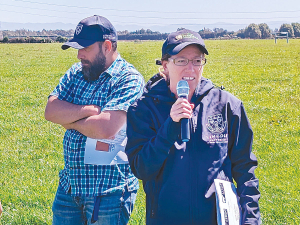Low-footprint feed drives high-profit, low-emissions dairy
The key to a dairy system that generates high profit with a low emissions intensity is using low footprint feed, says Fonterra program manager on-farm excellence, Louise Cook.
 Lincoln University’s Rachael Bryant (right) and Omar Al-Marashdeh speak at a recent Lincoln University Demonstration Dairy Farm Focus Day.
Lincoln University’s Rachael Bryant (right) and Omar Al-Marashdeh speak at a recent Lincoln University Demonstration Dairy Farm Focus Day.
The Lincoln University Dairy Farm (LUDF) is rethinking its approach to plantain, in the face of continued difficulty in realising its expected benefits.
For some years now, the herb has been touted as a powerful means of reducing nitrogen leaching from dairy farms, but Lincoln University researcher Racheal Bryant told attendees at the farm's recent February Focus Day that LUDF had struggled with plantain, especially in weed control and pasture establishment.
“From an environmental point of view there’s a lot of evidence to demonstrate that that it can have benefits, but if it’s not implemented in the way that it’s been tested and the evidence provided, then we don’t believe we’re getting the benefits here at LUDF.”
Bryant said they don’t want to “pollution swap” by mitigating nitrogen at the expense of worsening greenhouse gas emissions.
Nor did they want to reduce efficiency and profitability, if plantain meant less feed produced and harvested.
“We’re reviewing the effect of plantain on meeting the targets.
“How much is it costing us? Is it impacting positively on our profitability benchmarks and our environmental benchmarks?
“We are reviewing all of those and then essentially looking at how we can make it work out.”
Bryant’s presentation took place in a paddock which she said had been established as a pure plantain sward but was now back in grass with very few plantain plants in evidence.
“The number of grazings we were able to get out of the pure sward of plantain was less compared to the rest of the farm so that was putting pressure on other paddocks because we weren’t getting the grazing days from the plantain.
“The long - from six weeks to 12 weeks - establishment meant that soil was in a fallow state for a lot longer period, so that can impact our calving.”
She said that at LUDF plantain was not shown to yield as well as for perennial ryegrass/white clover mixes.
“So, we’ve just got to follow the science. We would be looking at accepting production losses if we can make some big environmental gains.”
Bryant said LUDF would stick with plantain but would look at comparing establishment methods of broadcasting and direct-drilling in spring and autumn.
When first adopted, 30% plantain swards was what the science suggested but now she did not think they could make that work, and would aim for 10 to 15%.
However, Bryant said a lot of the monitor farms taking part in the big Plantain Potency Project (led by DairyNZ with MPI, PGG Wrightson Seeds, and Fonterra) were having a lot of success.
“They’re not having as many difficulties as LUDF is having. We’ve got to diagnose what some of the issues are that’s causing the problems at LUDF but certainly this is one sample size as far as how plantain is performing in the wider community.
“This is an exception, not the rule, I believe.”
Her colleague, Senior Lecturer Omar Marashdeh, told the focus day that plantain was an attractive option for nitrate reduction because it required no major changes in the farm system, nor significant capital investment or infrastructure.
He said plantain works by four modes; two above-ground in-animal effects, being dilution through higher frequency and volume of urination, and a partitioning effect in the gut that puts more nitrogen into faeces and milk; and two in-soil effects of the plant roots that both slow nitrification.
Agrisea NZ has appointed Craig Hudson as it's new chief growth officer.
State farmer Landcorp, trading as Pamu, is a forecasting a full-year net profit of around $100 million.
Tony Aitken, chief executive of Ruralco, has been awarded the Excellence in Business Leadership Award at the ANZ Business of the Year Awards.
Global trade has been thrown into another bout of uncertainty following the overnight ruling by US Supreme Court, striking down President Donald Trump's decision to impose additional tariffs on trading partners.
Controls on the movement of fruit and vegetables in the Auckland suburb of Mt Roskill have been lifted.
Fonterra farmer shareholders and unit holders are in line for another payment in April.

OPINION: Here w go: the election date is set for November 7 and the politicians are out of the gate…
OPINION: ECan data was released a few days ago showing Canterbury farmers have made “giant strides on environmental performance”.